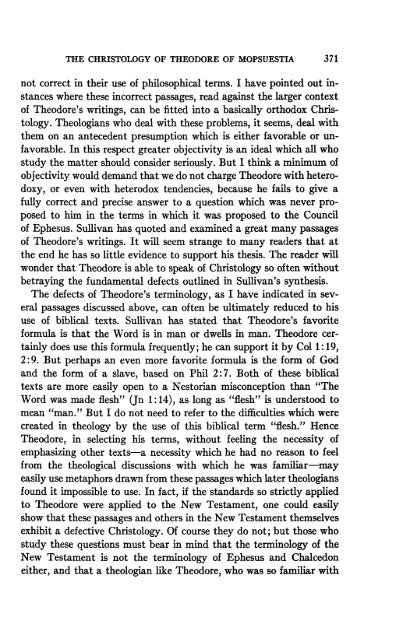ANNOTATIONS ON THE CHRISTOLOGY OF THEODORE OF ...
ANNOTATIONS ON THE CHRISTOLOGY OF THEODORE OF ...
ANNOTATIONS ON THE CHRISTOLOGY OF THEODORE OF ...
Create successful ePaper yourself
Turn your PDF publications into a flip-book with our unique Google optimized e-Paper software.
<strong>THE</strong> <strong>CHRISTOLOGY</strong> <strong>OF</strong> <strong>THE</strong>ODORE <strong>OF</strong> MOPSUESTIA 371<br />
not correct in their use of philosophical terms. I have pointed out instances<br />
where these incorrect passages, read against the larger context<br />
of Theodore's writings, can be fitted into a basically orthodox Christology.<br />
Theologians who deal with these problems, it seems, deal with<br />
them on an antecedent presumption which is either favorable or unfavorable.<br />
In this respect greater objectivity is an ideal which all who<br />
study the matter should consider seriously. But I think a minimum of<br />
objectivity would demand that we do not charge Theodore with heterodoxy,<br />
or even with heterodox tendencies, because he fails to give a<br />
fully correct and precise answer to a question which was never proposed<br />
to him in the terms in which it was proposed to the Council<br />
of Ephesus. Sullivan has quoted and examined a great many passages<br />
of Theodore's writings. It will seem strange to many readers that at<br />
the end he has so little evidence to support his thesis. The reader will<br />
wonder that Theodore is able to speak of Christology so often without<br />
betraying the fundamental defects outlined in Sullivan's synthesis.<br />
The defects of Theodore's terminology, as I have indicated in several<br />
passages discussed above, can often be ultimately reduced to his<br />
use of biblical texts. Sullivan has stated that Theodore's favorite<br />
formula is that the Word is in man or dwells in man. Theodore certainly<br />
does use this formula frequently; he can support it by Col 1:19,<br />
2:9. But perhaps an even more favorite formula is the form of God<br />
and the form of a slave, based on Phil 2:7. Both of these biblical<br />
texts are more easily open to a Nestorian misconception than "The<br />
Word was made flesh" (Jn 1:14), as long as "flesh" is understood to<br />
mean "man." But I do not need to refer to the difficulties which were<br />
created in theology by the use of this biblical term "flesh." Hence<br />
Theodore, in selecting his terms, without feeling the necessity of<br />
emphasizing other texts—a necessity which he had no reason to feel<br />
from the theological discussions with which he was familiar—may<br />
easily use metaphors drawn from these passages which later theologians<br />
found it impossible to use. In fact, if the standards so strictly applied<br />
to Theodore were applied to the New Testament, one could easily<br />
show that these passages and others in the New Testament themselves<br />
exhibit a defective Christology. Of course they do not; but those who<br />
study these questions must bear in mind that the terminology of the<br />
New Testament is not the terminology of Ephesus and Chalcedon<br />
either, and that a theologian like Theodore, who was so familiar with
















